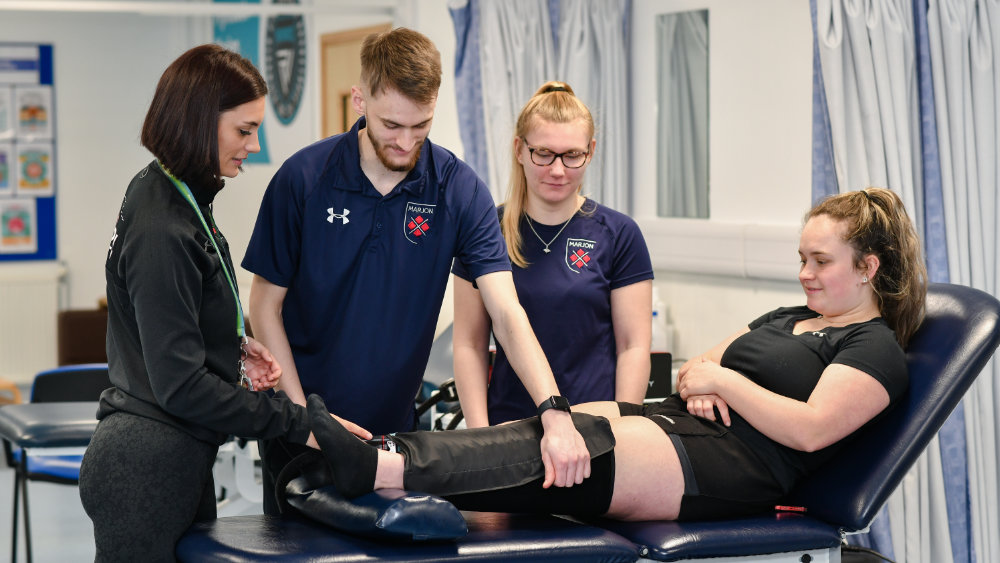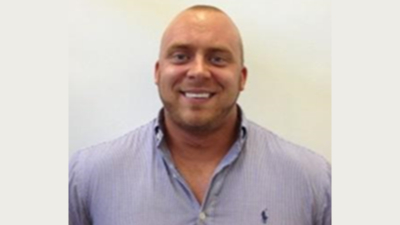MSc Injury Prevention and Musculoskeletal Rehabilitation
This programme empowers you to excel in injury prevention, rehabilitation, and performance enhancement, all with the flexibility to fit your career goals.


Flexible mixture of online and face to face sessions to suit applicants

Apply now for this course
A degree at 2:1 or above in a subject related to sport and health sciences
Applicants with other relevant professional experience and/or qualifications will be considered on an individual basis
UCAS code N/A
UCAS institution code P63
Duration One year full-time, two years part-time
Course Summary
The Master's programme in Injury Prevention and Musculoskeletal Rehabilitation is tailor-made for various healthcare professionals, including sports therapists, sports rehabilitators exercise scientists, physiotherapists, strength and conditioning coaches, and podiatrists, who possess experience in sports performance and injury management. This course is ideal for dedicated practitioners looking to enhance their expertise in the field of injury prevention and rehabilitation. The programme is designed to expand your proficiency in assessing and treating athletes across all age groups and skill levels, covering the entire health-illness-performance spectrum.
Our program offers flexible study options, allowing you to choose between part-time and full-time engagement. It employs a blended learning approach, offering the versatility to customize your learning journey to align with your professional practice and individual career aspirations. With a focus on enhancing your knowledge and skills, this program will empower you to excel in the dynamic field of injury prevention and musculoskeletal rehabilitation.
Why study Injury Prevention and Musculoskeletal Rehabilitation at Marjon?
Cutting-Edge Innovation: Experience an exciting, innovative master's programme that stays at the forefront of industry trends and advancements in injury prevention and rehabilitation.
State-of-the-Art Facilities: Benefit from our modern facilities and advanced equipment, providing you with a practical, hands-on learning experience.
Expert Staff: Learn from our dedicated and experienced staff who possess in-depth knowledge in injury prevention and musculoskeletal rehabilitation, providing you with valuable insights and guidance.
Flexibility: Tailor your learning experience to fit around your professional commitments with flexible part-time and full-time study options.
Real-World Application: Apply what you learn in the classroom directly to your workplace, ensuring that your newfound skills can have an immediate and positive impact.
Reputation for Excellence: Join a program at a respected institution known for producing successful graduates who excel in their fields of practice.
Modules for this course
1st Year
Biomechanics and Injury Prevention
MSK Rehabilitation
Research and Evidence in Practice
Managing the Modern Athlete
Rehabilitation and prevention within special populations
Contemporary approaches to Health Behavior Changes
Masters Thesis
Please note: This course is subject to validation which means that it is either a new course or that the content is currently being updated. You can apply for this course now while some of the details of the course are being finalised by the University. Please contact the course leader if you would like further information.
This course is perfect if you're curious about...
Should athletes embrace pain as a part of their sport, or should all efforts be made to prevent any discomfort or injury?
Is the use of performance-enhancing substances ethically justifiable in the context of injury prevention and rehabilitation for professional athletes?
What's more important in rehabilitation: addressing the physical aspects of an injury or the psychological and emotional impact on the athlete?
Should injury prevention measures be standardized across all sports, or should they be tailored to the unique demands of each sport and athlete?
Do technological advancements, like wearable fitness trackers and tele-rehabilitation, positively or negatively affect the field of musculoskeletal rehabilitation and injury prevention?
What ethical considerations should be taken into account when deciding whether an athlete with a history of frequent injuries should continue in their sport, considering the risk of further harm?
How you’ll be taught and assessed?
How will you be taught?
Our teaching approach will combine various methods to provide a comprehensive learning experience:
Synchronous Online Sessions: Engage in real-time virtual classes, fostering interaction with instructors and peers.
Asynchronous Resources: Access pre-recorded lectures and course materials, offering flexibility to accommodate individual schedules.
In-Person Learning: Participate in face-to-face sessions for both theoretical and practical components of the program.
On-Site Intensive Sessions: Benefit from on-site face-to-face instruction for two days each month to enhance hands-on learning.
How will you be assessed?
What are the course assessment methods? Students will be evaluated through a variety of assessment types, including case studies, digital presentations, essays, practical assessments, poster presentations, oral presentations, and a thesis.

Sarah has worked with international, national and local sports persons from a variety of disciplines for over 20 years. She holds professional qualifications in manual therapy, acupuncture and she is a tutor for the RFU Intermediate Care in Sport qualification. She is also the Vice-Chair of the Sports Therapy Organisation (STO) and a member of the Federation of Holistic therapists (FHT) and the British Association of Sport and Exercise Sciences (BASES) . Her research expertise is in the use of kinesiology tape in the reduction of acute and chronic pain.
Lecturers
Fees and funding
Fees UK students: £8,500
Fees for International students: £14,600
This fee covers your tuition and access to course-specific equipment and facilities, as well associated services including access to the library, study skills support, IT support, student support and wellbeing services and membership of the Student Union. There may be additional costs by course.
Funding available for this course
Our Student Funding Advisors offer confidential and impartial advice about your funding options.
Postgraduate funding

